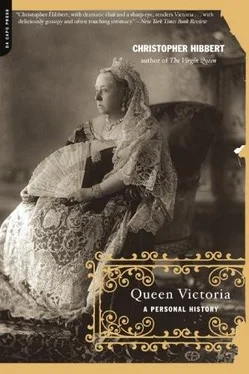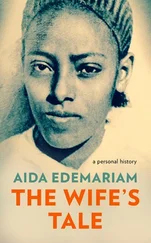Christopher Hibbert - QUEEN VICTORIA A Personal History
Здесь есть возможность читать онлайн «Christopher Hibbert - QUEEN VICTORIA A Personal History» — ознакомительный отрывок электронной книги совершенно бесплатно, а после прочтения отрывка купить полную версию. В некоторых случаях можно слушать аудио, скачать через торрент в формате fb2 и присутствует краткое содержание. Жанр: Биографии и Мемуары, на английском языке. Описание произведения, (предисловие) а так же отзывы посетителей доступны на портале библиотеки ЛибКат.
- Название:QUEEN VICTORIA A Personal History
- Автор:
- Жанр:
- Год:неизвестен
- ISBN:нет данных
- Рейтинг книги:5 / 5. Голосов: 1
-
Избранное:Добавить в избранное
- Отзывы:
-
Ваша оценка:
- 100
- 1
- 2
- 3
- 4
- 5
QUEEN VICTORIA A Personal History: краткое содержание, описание и аннотация
Предлагаем к чтению аннотацию, описание, краткое содержание или предисловие (зависит от того, что написал сам автор книги «QUEEN VICTORIA A Personal History»). Если вы не нашли необходимую информацию о книге — напишите в комментариях, мы постараемся отыскать её.
QUEEN VICTORIA A Personal History — читать онлайн ознакомительный отрывок
Ниже представлен текст книги, разбитый по страницам. Система сохранения места последней прочитанной страницы, позволяет с удобством читать онлайн бесплатно книгу «QUEEN VICTORIA A Personal History», без необходимости каждый раз заново искать на чём Вы остановились. Поставьте закладку, и сможете в любой момент перейти на страницу, на которой закончили чтение.
Интервал:
Закладка:
'My God, how glad I am to hear of you,' the Dowager Duchess responded in a letter to her daughter. 'I cannot find words to express my delight that everything went so smoothly ... I cannot write much ... dear mouse ... for I am much too happy.' She hoped the mother was not disappointed that the baby was a girl: 'The English,' she said, 'like Queens.' 8As for the child's father, he was to show her proudly to his friends, telling them to 'look at her well, for she will be Queen of England'. 9
The Duke's excitement at the arrival of his little 'pocket Hercules' at Kensington was not shared by the rest of the family. According to Prince Leopold, the Prince Regent did not trouble to disguise his hope that his brother would soon clear off to Germany again, taking his wife and child with him. Certainly the Regent's behaviour at the baby's christening was far from fraternal. He announced that the ceremony must be a strictly private occasion and that it should take place on 24 June at three o'clock in the afternoon. The godparents were to be himself, Tsar Alexander, the child's grandmother, the Dowager Duchess of Coburg, and the baby's aunt Charlotte, her father's sister, widow of the King of Wurttemberg. None of these, apart from the Regent, was to be present and so they were represented by the Duke of York, and two others of the baby's aunts, the unmarried Princess Augusta and Mary, Duchess of Gloucester. The only other persons to attend, apart from the parents, were the Duke of Kent's cousin, the Duke of Gloucester, the Duchess of York and Prince Leopold.
As a matter of form, the parents sent a list of names proposed for the child to the Prince Regent - Victoire (her mother's name), Georgiana (in deference to the Regent), Alexandrina (in deference to the Tsar), and Charlotte and Augusta (the names of her aunts). Nothing was heard from the Regent until the day before the christening when he wrote to say that he could not allow the name of Georgiana to be used as he did not choose to place his name before the Tsar's, 'and he could not allow it to follow'. 10He would indicate the other names at the ceremony, disapproving of Charlotte, the name of his dead daughter, and of Augusta as being too majestic.
The ceremony took place in the Cupola Room at Kensington Palace, the walls of which had been draped with crimson velvet for the occasion. In the room stood a splendid silver gilt font which had been ordered by Charles II and first used in 1688 for the christening of his nephew -Prince James Francis Edward Stuart, the 'Old Pretender'. Waiting beside it stood the Archbishop of Canterbury, Charles Manners-Sutton, a grandson of the Duke of Rutland, and the Bishop of London, William Howley, a scholarly but otherwise (in Charles Greville's opinion) 'very ordinary man' who was to succeed Manners-Sutton as Archbishop in 1828. Neither of them had any idea what the names were to be when the ceremony began and the Archbishop had the child in his arms. He looked towards the parents, then towards the Regent, for enlightenment. The Regent announced 'Alexandrina'. There was a pause. The father proposed Elizabeth. The Regent dissented, then, looking at the Duchess of Kent who had been reduced to tears, he said sharply, 'Give her the mother's name also then, but it cannot precede that of the Emperor.' 11So the child was christened Alexandrina Victoria, and in her early years was generally known by the diminutive of the first name, Drina.
The Regent had not spoken to the Duke of Kent during the ceremony; nor had he seen fit to suggest that his other brother, the Duke of Sussex (with whom he was, as usual, quarrelling), should be asked to attend the ceremony, though he was then living in Kensington Palace in an apartment furnished with 50,000 books and numerous clocks. Nor did the Regent attend the dinner party which was given afterwards; nor yet did he deign to notice the Duke of Kent's presence a few weeks later at a reception given at the Spanish Embassy where he was seen actually to turn his back on him. That same month at a military review, to which the Duke and Duchess had ill-advisedly taken their baby daughter, the Regent was heard to expostulate, 'What business has that infant here?' 12
There could be no question of the Regent coming to the help of the Duke who was once more deeply in debt, having spent with characteristic extravagance far more than he could afford on furniture and improvements for his apartments in St James's Palace, including several thousand pounds' worth of looking-glasses. He had a country house, Castle Hill at Ealing, on which equally lavish sums had been spent and which, with its furniture and land, was estimated to be worth about £70,000; but when he applied for parliamentary consent to sell the property by means of a lottery, the Leader of the House of Commons declined to consider the proposal. He then considered selling the place in lots but was advised by auctioneers to wait until the spring. So the Duke decided to move to the West Country where he and his family and household could live more modestly in a rented house and where the mother of his child might benefit from 'luke warm sea baths' and the healthy air of the Devonshire coast.
Accompanied by his equerry, John Conroy, the Duke set off for Devonshire by way of Salisbury where he caught a bad cold. He had been looking round the freezing cathedral and had called on the Bishop, John Fisher, who had been his childhood preceptor and was the uncle of Conroy's wife, Elizabeth, daughter of Major-General Benjamin Fisher. From Salisbury he sent a letter to his 'beloved and very dear wife' to whom he wrote affectionately every day.
In Devonshire the Duke and Conroy looked at various houses along the coast, none of which was satisfactory, until at Sidmouth they chanced upon a pretty house with a partly castellated roof and Gothic windows, Woolbrook Cottage, Woolbrook Glen.
The Duke decided to take it; and on Christmas Day he and his family moved in as snow covered the ground outside. For days it was dreadfully cold and wet. The Duchess and her daughter, Feodora, ventured out to take walks along the coast; but the Duke stayed indoors for most of the day, writing letters. His stomach had been upset when they first arrived and, so he complained, 'the water had already begun to play the very deuce with [his] bowels'. Then, at the beginning of January 1820 he caught another cold which became so feverish that the Duchess called in his physician, Dr Wilson, who was much concerned by his case. On the evening of the twelfth his patient complained of pains in his chest and was overcome by nausea. Soon he was delirious. The Duchess, distracted, rarely left his side. She sent an urgent request to London for Sir David Dundas, the eminent physician, to come to Sidmouth; but Dundas was in attendance on the dying King George III at Windsor. Dr William Maton, who had been Queen Charlotte's physician, came instead. His arrival was no comfort to the Duchess: he spoke little French and scarcely any German, and the Duchess's English, despite her efforts to learn the language, was not yet good enough for her to communicate with him or adequately to protest against the tormenting treatment which he, like Dr Wilson, prescribed their helpless patient.
The Duke was bled and cupped day after day; blisters were applied to his chest; then he was cupped and bled again until, as the Duchess wrote to a friend, there was 'hardly a spot on his dear body which [had] not been touched by cupping, blisters or bleeding ... I cannot think it can be good for the patient to lose so much blood when he is already so weak ... He was terribly exhausted yesterday after all that had been done to him by those cruel doctors.' 13Although 'half delirious' he was induced to sign a will, appending his signature to the document with the most pathetic determination before sinking back on to his pillow. He died the next morning. The Duchess, who had, she said, 'adored him', knelt beside his bed, holding his hand. 14
Читать дальшеИнтервал:
Закладка:
Похожие книги на «QUEEN VICTORIA A Personal History»
Представляем Вашему вниманию похожие книги на «QUEEN VICTORIA A Personal History» списком для выбора. Мы отобрали схожую по названию и смыслу литературу в надежде предоставить читателям больше вариантов отыскать новые, интересные, ещё непрочитанные произведения.
Обсуждение, отзывы о книге «QUEEN VICTORIA A Personal History» и просто собственные мнения читателей. Оставьте ваши комментарии, напишите, что Вы думаете о произведении, его смысле или главных героях. Укажите что конкретно понравилось, а что нет, и почему Вы так считаете.











